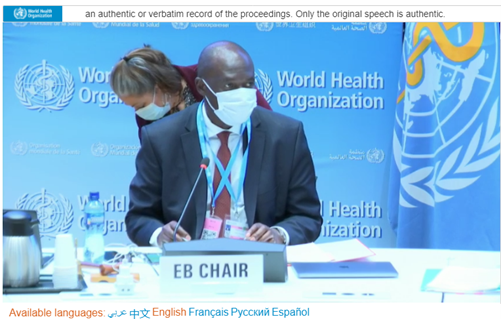WHO EB recommends Alcohol Action Plan
On January 27th the World Health Organisation (WHO) Executive Board (EB) meeting adopted a decision recommending the World Health Assembly (WHA) in May 2022 to adopt the “Draft action plan (2022–2030) to effectively implement the global strategy to reduce the harmful use of alcohol as a public health priority”.
10 WHO EB members and 15 non EB Member States addressed the alcohol action plan in their interventions during the debate.

In general, there was great support of the draft action plan and Member States underlined the need to accelerate action on alcohol. Need for evidence based policies, protection against conflict of interest of the alcohol industry, more frequent reporting and international collaboration was highlighted.
France, talking on behalf of EU and several other countries requested the WHO Secretariate to draft a separate document to guide Member States in their interaction with the alcohol industry. The request for a stand-alone document was also brought forward in some form or another from Kenya, talking on behalf of the countries in the African region, Slovenia, Belgium, Norway, South Africa and Uruguay.
Kenya, talking on behalf of Member States in the African region, requested reporting biannually to the WHO governing bodies. This was reflected by France that also requested that the progress in implementation of the action plan should be discussed by the WHO governing bodies on regular intervals between now and 2030. Thailand also pointed to the need for regular monitoring on the progress in country implementation, including on emerging risks
Several interventions referred to the best buys policy measures and the need for evidence-based interventions. The WHO initiative SAFER to support Member States in developing alcohol policy was also mentioned in several interventions and many of them focused on countries experience with domestic alcohol policy interventions. Russia shared their experience and expressed an intention to be a leader in this area together with the WHO EURO region. Namibia also shared their experience of developing a draft national alcohol policy with support from WHO.
Slovenia had a particularly strong intervention pointing out that alcohol is the only psychoactive substance that is not covered by a legally binding treaty, the need for such a treaty and as a first step the need to improve global governance including revitalizing the network of national focal points and having a global ministerial conference. The point about lack of an international binding instrument was also stated by Thailand, who focused on the need for cost-effective interventions, including SAFER. Both Ecuador and Uruguay supported firm actions on alcohol harm. Ecuador stated that the Action Plan could go further and pointed out that it gives the industry a role which is not suitable for interaction with WHO. Ecuador expressed full commitment to regulate alcohol consumption and pointed to the experience from tobacco and the Framework Convention on Tobacco Control (FCTC) as a guide for policy development.
On the other side some interventions, while still supporting the draft action plan, were less firm. UK promoted “clear role for collaborative work with the industry”. USA expressed that they still have some concerns related to labelling and mention of trade in the action plan. The intervention expressed that they will send these for final consideration by the Secretariat. Brazil also expressed that they would like to have more time to discuss and finalize towards WHA leaving some uncertainty about the process forward.
Four NGOs spoke about alcohol: World Heart Federation, Movendi International, World Cancer Research Fund International, and Union for International Cancer Control, all welcoming the action plan while expressing some concerns by some shortcomings that might hinder action.
The secretariat summed up the debate and noted several of the points raised. Director General, Dr. Tedros also took the floor and commented on the whole of the NCD discussion. The Chair noted that there were no objections noted and that the draft decision thereby was adopted.